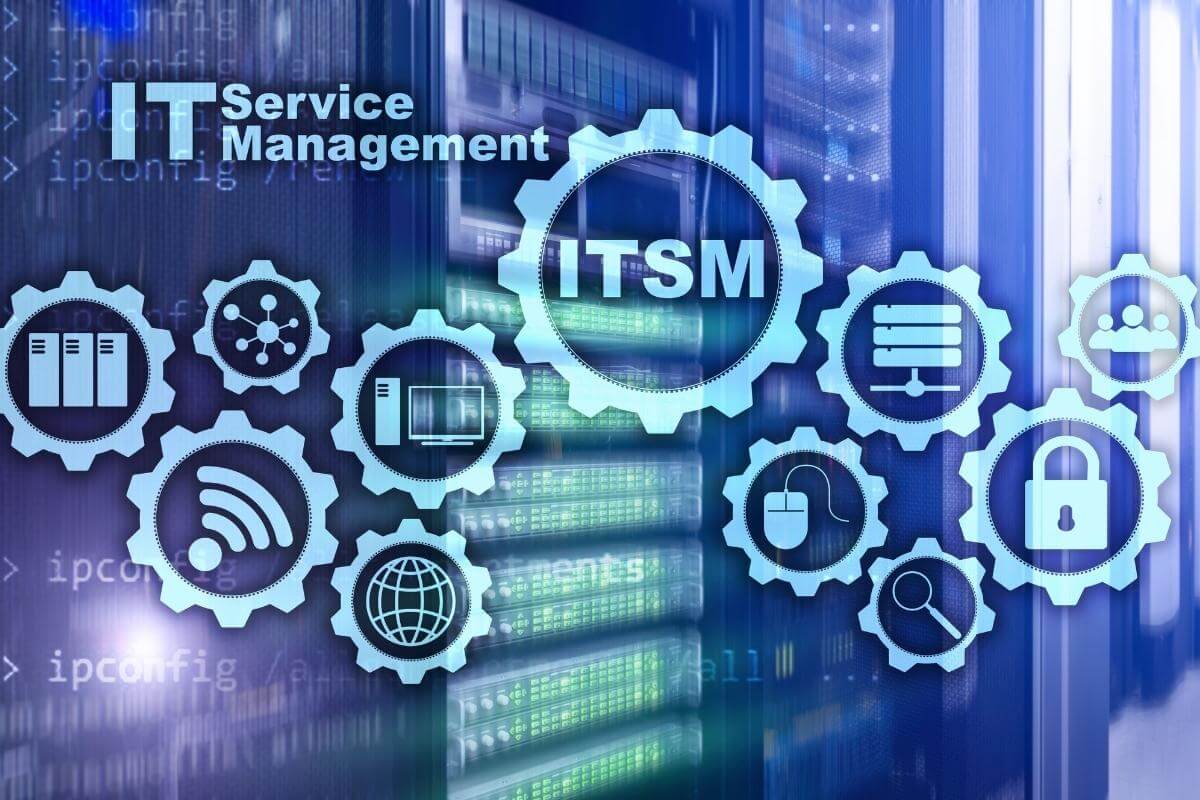Table of Contents
Technology modernization helps accelerate success for many enterprises. But not all companies can keep pace with the advancement, especially small businesses. Establishing an in-house information technology (IT) team requires considerable recruitment, system deployment, and maintenance funding.
Outsourced technical support allows small businesses to save on costs while enhancing IT services. It helps them speed up customer responses and focus on their core capabilities to keep up with the competition.
This article explains how small businesses benefit from outsourcing their IT services and how they can accomplish this.
What Are Outsourced IT Services for Small Businesses?

Outsourcing IT support is when a company contracts with a third-party service provider to perform specific IT support tasks. Functionally, this is part of business process outsourcing (BPO), which is when companies outsource part of their front- or back-office work. BPO helps small companies prioritize growth by handling their non-core functions.
As technology advances, small enterprises encounter increased demands for IT support services. Because of limited budgets and resources, they struggle to meet such needs while they’re also trying to ensure growth and stability. So, they rely on BPO to achieve cost reductions, streamlined IT support, and continued growth.
According to Clutch, 90% of 1,003 polled small businesses want to outsource their tasks this year. The ratings and reviews platform notes that these enterprises aim to save time and grow through outsourcing. They also plan to work with external experts across various business functions.
Which IT Functions to Outsource
Before reaping the benefits of outsourcing, small enterprises need to know which IT functions to outsource. These insights will help them better align resources with their BPO providers. IT support services that are commonly outsourced include:
- Technical support: focusing on IT inquiries such as device defects, computer errors, and tech repairs.
- Application/Software development: building mobile apps or computer programs to accommodate specific user needs.
- Troubleshooting: identifying and fixing complicated faults in electronic systems such as computers and smartphones.
- Data entry: inputting raw data into computer systems and databases.
- Web hosting: providing storage space and access to websites.
- Telecommunications: solving network issues, including internet service loss, slow broadband connectivity, and lagging.
- Identity and access management: ensuring authorized user access to technology resources.
- Cloud services: providing digital infrastructure for storing, retrieving, and organizing data over the internet.
- Security: monitoring and strengthening cybersecurity against online threats.
- Data analytics: reviewing datasets to identify the latest market trends and inform business strategies.
How Outsourced IT Services Help Small Businesses

IT support outsourcing has expanded steadily in the past few years due to digital transformation. The industry is expected to grow significantly in the coming years. Statista expects the IT BPO market revenue to reach $587.3 billion by 2027, with an 8.26% compound annual growth rate (CAGR).
Cost-effectiveness primarily drives the increased demand for outsourced IT services, especially for small businesses. Aligning outsourcing with operational needs and budget plans can provide solid benefits to companies, including:
Lower Expenses
Cost reduction is the top reason many companies adopt front-office or back-office outsourcing. Hiring a BPO provider helps reduce their labor and infrastructure expenses. This advantage best suits small businesses with limited capacity and budgets.
Businesses consider IT support services their non-core tasks—essential but not directly profitable. And establishing an in-house team is an expensive investment without tangible returns. The funds might be better spent on improving their primary products or services.
On the other hand, third-party providers treat IT support as their core capability and offering. They recruit and train skilled professionals to handle this repetitive task effectively. They also use up-to-date technology to accelerate work.
Most importantly, service providers charge reasonable prices, payable monthly or right after service completion. Small businesses that outsource IT services can keep up with the latest market trends and demands without spending extra dollars.
Improved Efficiency
Both companies and customers encounter tech issues daily. As new updates and solutions emerge, problems with outdated systems also occur. While businesses deal with internal IT challenges, they must also address their customers’ tech concerns to maintain brand loyalty.
Small businesses struggle to meet such demands due to resource constraints. Their small headcounts also prevent them from responding to customer inquiries and resolving in-house issues simultaneously. These time and personnel constraints impact their productivity.
Outsourced IT services for small businesses help reduce backlogs and delays. Vendors provide tech support experts and advanced software tools to ease responses to ever-growing customer requests and complaints during hectic periods.
Expanded Workforce
Small businesses employ fewer than 250 people. Despite having a small customer base compared to larger companies, small enterprises still face complex situations when busy seasons come. But they don’t have sufficient capital to expand their in-house workforce quickly.
BPO enables small enterprises to scale up their labor force during busy seasons quickly. They can temporarily hire a specific number of skilled professionals from third-party companies to help address their work backlogs.
As a result, small businesses no longer need to spend on recruiting, training, and compensating new full-time employees. Instead, they pay third-party workers a fixed price upon delivering assigned front-office and back-office outsourcing services.
Advanced Technology Optimization
Modern technologies are crucial in responding to customers’ IT concerns. But tech deployment, maintenance, and modernization demand considerable funds and efforts. These hinder small enterprises from acquiring such platforms for tech support.
Outsourced IT services for small businesses offer a chance to take advantage of advanced technologies at affordable prices. To streamline IT support, providers use solutions such as artificial intelligence (AI), cloud computing, and robotic process automation (RPA). They also use knowledge-based systems and analytics tools for business strategies.
These latest platforms are also crucial when small businesses outsource data entry. They need an integrated solution to handle massive data from daily transactions accurately. They can have this advanced solution at a reasonable price by working with a third-party service provider.
Improved Flexibility and Scalability
Companies can measure success based on how they deal with challenges during hectic periods. They must get out of their comfort zones to embrace sudden market changes. Otherwise, they’ll be left behind by the fast-paced competition.
Despite experiencing resource barriers, small businesses can improve their flexibility and scalability through outsourcing. BPO providers can adjust their operations and strategies to accommodate their clients’ needs. They also constantly monitor the latest market trends for continued service improvement.
Outsourcing eliminates the need for small businesses to spend much on recruitment and tech procurement, especially during peak seasons. They can hire a contractor to support their IT services only during these periods. They don’t have to hire and compensate full-time employees or buy niche equipment for repetitive tasks.
But to fully achieve maximum flexibility and scalability, small businesses must know what an outsourced IT provider is. To better align their operational strategies, they must understand outsourcers’ work ethics and culture.
Prioritized Growth
As previously mentioned, small businesses want to outsource to expand. Outsourcing helps them achieve that goal in many ways.
BPO providers streamline outsourced IT services for small businesses. Their highly trained tech support agents and advanced systems accelerate responses to customer inquiries. Consequently, customer satisfaction and retention are higher, driving increased profitability for small enterprises.
In addition to streamlined IT support, contractors help small businesses enhance their products and services by performing customer feedback collection and analysis. The gathered data provides these enterprises an overview of changing consumer preferences, allowing them to develop customer-focused offerings.
Most importantly, BPO enables small businesses to prioritize their core functions. They have sufficient time to enhance their primary capabilities and offerings while entrusting their help desk to contractors. Because these contractors prioritize high-quality tech support, small businesses don’t have to worry about unattended consumer concerns.
Strengthened Security
IT services, specifically tech support and data entry, involve handling personal information and other sensitive data. Most inquiries and transactions occur online, exposing data to various cyber threats. Hence, companies must safeguard their enterprise and customer data to avoid high mitigation costs.
Small businesses planning to outsource data entry services and tech support can expect providers to help strengthen their information security. Contractors strictly follow security policies and procedures to protect customer data. They also use sophisticated software solutions to boost cybersecurity.
Some companies don’t want to pay their external vendors extra dollars to address cyberattacks and cyber threats. Instead, they implement practical security measures to detect and respond to potential vulnerabilities immediately. This action allows them to maintain a good market reputation and build customer trust.
Steps in Building an Efficient Outsourced IT Support Team

Learning about the benefits of outsourced IT services for small businesses isn’t enough. Companies also need to know how to establish an outsourced IT support team. Follow these simple tips to set up your third-party IT support unit.
- Evaluate needs. Identify which IT services you want to delegate to a BPO provider. Consult your teams to know which tasks can best be outsourced and retained in-house. Then clearly define your goals for outsourcing.
- Develop budget plans. Immediately plan your outsourcing budget after brainstorming. Perform cost analyses to align outsourcing investments with your operational funds. Ensure that you’ll generate savings and increase revenue when hiring an IT support provider.
- Identify potential partners. Select at least three candidates for your outsourced IT services. Thoroughly check their service history, reputation, personnel, tech innovation, security, and compliance. Ask them directly about their service packages.
- Host training sessions. After choosing a provider and finalizing contract terms, hold training sessions to introduce your products and services. Also, discuss your work ethics, culture, and company rules. This step is vital to match your operational strategies and avoid future conflicts.
- Set regular meetings. Schedule monthly or weekly meetings to discuss work performance. You can also exchange insights into how to improve your IT products and services.
The Bottom Line
Limited resources challenge small businesses to keep up with rapid digital transformation. The high overhead of establishing an in-house IT team prevents them from scaling up their IT support.
Outsourcing offers a cost-effective, scalable way to streamline IT services for small businesses. BPO providers offer skilled employees and advanced systems to handle time-consuming IT tasks. Businesses can thus prioritize their core capabilities for continued expansion.
If you’re a small business aiming to outsource IT services, understand how to establish your third-party IT support unit. From knowing your needs down to analyzing outcomes, these steps are crucial in optimizing BPO best.




